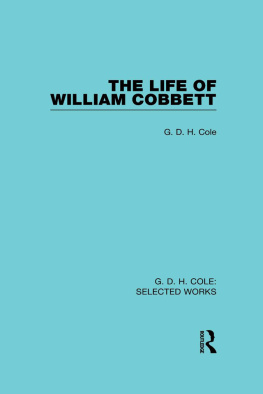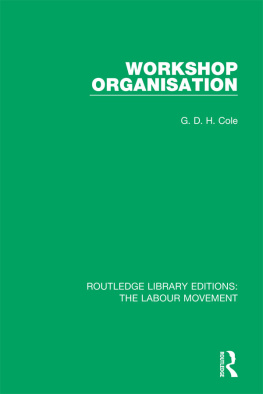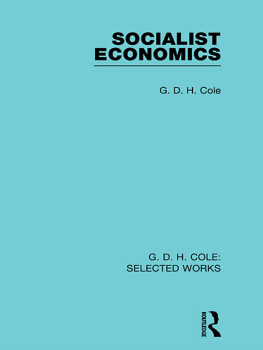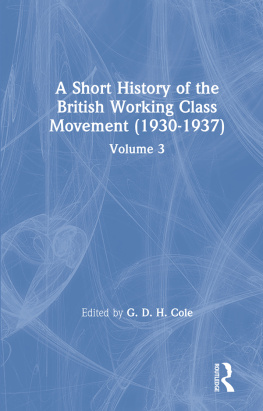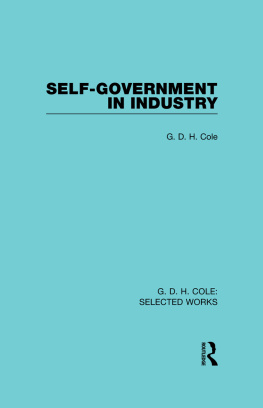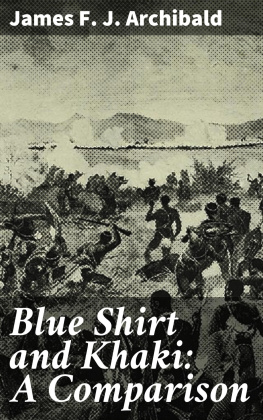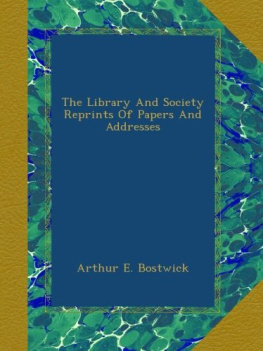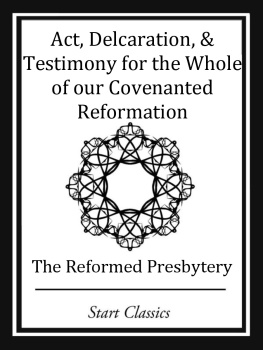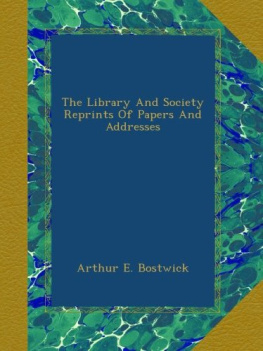G. D. H. COLE:
SELECTED WORKS
THE LIFE OF WILLIAM COBBETT
The Life of William Cobbett
G. D. H. Cole
Volume 5
First published in 1924
This edition first published in 2011
by Routledge
2 Park Square, Milton Park, Abingdon, Oxon, OX14 4RN
Simultaneously published in the USA and Canada
by Routledge
711 Third Avenue, New York, NY 10017, USA
Routledge is an imprint of the Taylor & Francis Group, an informa business
1924 H A Cole
All rights reserved. No part of this book may be reprinted or reproduced or utilised in any form or by any electronic, mechanical, or other means, now known or hereafter invented, including photocopying and recording, or in any information storage or retrieval system, without permission in writing from the publishers.
British Library Cataloguing in Publication Data
A catalogue record for this book is available from the British Library
ISBN 13: 978-0-415-56651-3 (Set)
eISBN 13: 978-0-203-83931-7 (Set)
ISBN 13: 978-0-415-59834-7 (Volume 5)
eISBN 13: 978-0-203-83957-7 (Volume 5)
Publishers Note
The publisher has gone to great lengths to ensure the quality of this reprint but points out that some imperfections in the original copies may be apparent.
Disclaimer
The publisher has made every effort to trace copyright holders and would welcome correspondence from those they have been unable to trace.
THE LIFE OF WILLIAM COBBETT
by
G. D. H. COLE
With a Chapter on Rural Rides by the late
F. E. GREEN.
Copyright, 1924.
Manufactured in Great Britain.
Preface
I MUST explain how I came to write this book. I had been for some years gathering together materials for a study of Cobbett, when I received a letter from the late Mr. F. E. Green. He told me that he was engaged in writing Cobbett's life, and asked me for the loan of certain of his books, difficult to obtain even in libraries. I lent him the books, and thought no more, for the time, of my own projected study. But within a few months Mr. Green dieda lamentable loss in these days when there are few who can write with power and insight of the labouring people of the English countryside. Mrs. Green asked me if I would write the book which her husband had begun, and I willingly undertook the task. Mr. Green's unfinished MSS. were placed in my hands, and I set to work upon them. He had written, I found, but one section, dealing with Cobbett's Rural Rides. The rest of his papers were mere scattered notes, giving no clear idea of the plan he had in mind.
For the whole of this book, with the single exception of ., on the other hand, is almost wholly his, only edited here and there by me so as to make it fit in with the general plan of the book.
It was fortunate for me, and for the readers of this volume, that Mr. Green began with Rural Rides ; for I profess to no intimate knowledge of the countryside, and I could not have come near his graphic study of this aspect of Cobbett's work and personality. He had done just what I could not have done, and I owe him a debtwhich alas I cannot repayfor helping me to make a better, and a more balanced book than I could have made alone.
Certain other debts I must acknowledge, Mr. R. Page Arnot has helped me greatly by the loan of his collection of Cobbett's writingsa valuable supplement to my own, which has saved me many weary days in libraries. Mr. J. L. Hammond has very kindly read the book for me in proof. I have also to thank Mr. Joseph Trask for his skill in searching out for me certain rare books that I needed, and my wife for valuable help and suggestions on many points. And especially I must thank Mrs. Green for giving me the chance of writing this book and placing her husband's papers at my disposal.
G. D. H. COLE.
HAMPSTEAD, June, 1924.
Oh, bear him where the rain can fall,
And where the winds can blow,
And let the sun weep o'er his pall,
As to the grave ye go!
And in some little lone churchyard
Beside the growing corn,
Lay gentle nature's stern prose bard,
Her mightiestpeasant born.
Yes! Let the wild-flower wed his grave,
That bees may murmur near,
When o'er his last home bend the brave,
And say"A man lies here."
EBENEZER ELLIOTT.
(From his Elegy on the Death of Cobbett.
Contents
| CHAP. |
THE PITT SYSTEMTHE PASSING OF ANTI
|
PERISH
|
|
COBBETT AND THE TRADE
|
|
|
|
Chapter I
The Times
THE life of William Cobbett spans the gulf between two worldsbetween the aristocratic feudalism of the eighteenth century and the plutocratic absolutism of the new industrial system. In first manhood he saw the fall of aristocratic feudalism in France, and heard the new watchword of Liberty, Equality, and Fraternity proclaimed amid the smoke of the burning chateaux and the flight of noble migrs to all the courts of Europe. He heard then the revolutionary voices calling for a world-wide crusade against the tyrants and the privileged orders. He watched the French Revolution through its successive phases, from the taking of the Bastille to the rise and fall of the Napoleonic Empire, felt the thrill which passed through Europe at the Terror and the execution of the King, marked the changes by which the war of Europe against Jacobinism and republican principles became a struggle against the revolutionary Imperialism of Napoleon, the military broom with which France swept out the petty courts and principalities, and cleared the way for a new Europe not of its planning, but largely the product of the forces which it had set in motion. From 1789 to 1815 the politics and the political thinking of Europe were dominated by the great fact of France, by the power of the ideas which the French Revolution, drawing some inspiration from its American predecessor, had set abroad in the world, by the struggle of the older order against that new power, and by the internal conflicts engendered by the breakdown of the established conventions and principles of eighteenth century politics.
Cobbett was twenty-six years old when the Bastille fell before the people of Paris. He was fifty-two when Napoleon suffered final defeat at Waterloo. In 1815 he had been writing steadily and voluminously on political questions for more than twenty years; but he had still written hardly a line of his best and most influential work. He had proved his genius as the most effective pamphleteer and political journalist of his time; but, had he died in 1815, he would have left behind him no clear message, and perhaps no single book that would have been remembered to-day. He had mastered fully long before then the art of political writing: only after the Peace did he really learn how to turn his mastery to purposeful use. His great books and his greatest journalism were the work of an old man.
The intensity of the struggle against France, the vicissitudes of the successive coalitions in which Pitt and the inheritors of his tradition marshalled the forces of Europe, first against Jacobinism and then against Napoleon, served to mask the vast changes in Great Britain itself which were taking place through the whole period of the French wars. If the French Revolution and the rise of Napoleon were facts of vital and overmastering importance to the world, the contemporary changes in the inner structure of English society were no less important, and no less world-wide in their effects. For, while the old world of the eighteenth century was employing all its resources in order to crush out the new things in politics which France represented and preached, changes in industry and agriculture were accomplishing, behind its back, a revolution far more subversive, and quite impossible to combat with the aristocratic military power which brought Napoleon at last to his knees. Had the new things in economics been allied with the new things in politics and inspired by the democratic ideas of 1789, the world might have seen, instead of modern capitalism, a democratic industrial order arising on the ruins of feudalism. But the new economic forces deployed behind the flashing swords of the dying feudal aristocracy; and drew from the financial needs and commercial opportunities of war an additional impetus and an increased power. Capitalism joined with feudalism to fight Napoleon, and was an essential instrument of his destruction. England bought victory, as she bought her European allies, with the subsidies furnished by her money-lords. The English aristocracy won the war only by getting into debt to the English capitalists. And this unholy alliance defeated, not so much France, as the common people of England.

